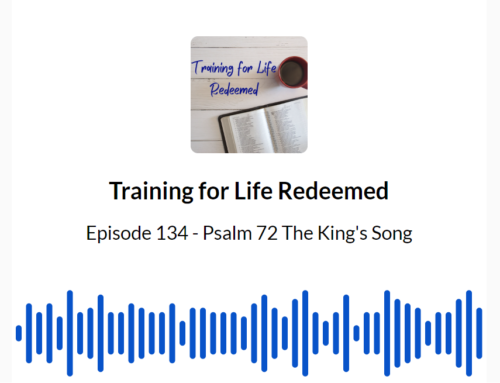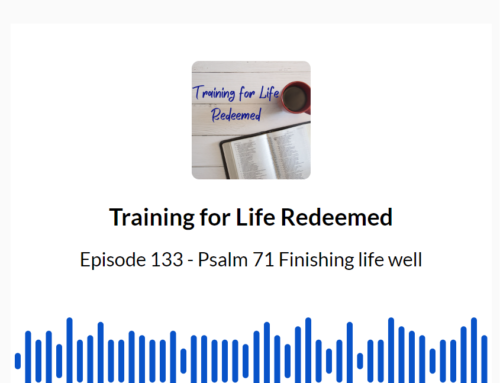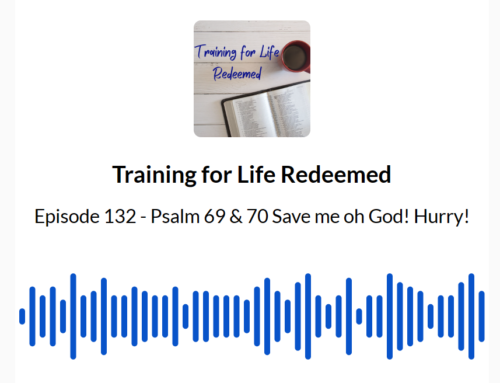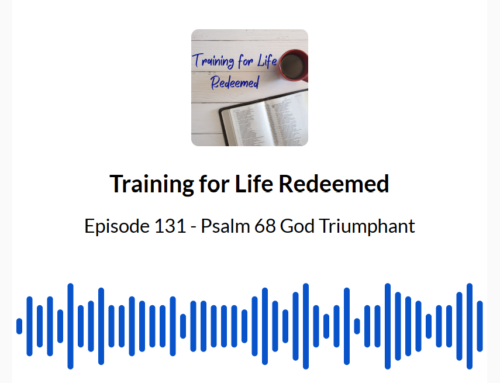We live in challenging times and, with Job, we have to deal with challenging
truths. Join us as we learn how these truths hold together in Christ and anchor
us in his peace and love.
Grab your notes for this episode by completing the form
and we will send you the link to all our notes.
Transcript
Dan: (00:00)
Well, hi everyone, and welcome to trainingforliferedeemed. I’m your host, Dan, and as always, I am joined by my father, David Jackson. Last year we ended up, we had just begun Job. We’d gone through the first 14 chapters. And so today we’re gonna pick it up again. In episode 53, we’re gonna be working from chapters 15 to 31 today as the debate between Job and his friends really begins to break down. Now there are as always studies that go along with this. So if you would like to get the studies that go with this head over to trainingforliferedeemed.com/ 53, you’ll be able to get everything you need there. Now, just to give a quick recap of where we’re up to the, the main thing we really need to know, and we know Job’s life has fallen apart. His friends have come to comfort him, but not done a very good job of that so far.
Dan: (00:53)
And there’s five truths that Dad has been telling us about that really help to kind of hold Job’s perspective, you know, the truth of the story together. And so those five truths are that God is in control and that everything that’s happening, even the bad stuff that’s happening to Job is part of his plan that God is righteous. And just, and he’s the definition really of what is right. That Job has been declared, blameless and righteous. The fourth one is that God cares for Job. And the last one is that Job has actually lost all this, all of his stuff, right? All this bad stuff, the death of his family and losing all of his possessions that is happening. So we can’t deny any of those five truths about what’s going on. And so this debate is gonna keep going. As people try and work out, what can they get rid of out of those five truths? Which ones do they need to keep and try to sort out how they might, if, if they are all true, how do they work together? How can God be in control, but also, causing all these things to happen to Job who is blameless and righteous and God be righteous at the same time. Like it it’s a difficult thing. So Dad, what is the key? How do these five things actually work?
David: (02:14)
Yeah, the it’s for Christians today. It’s, it’s fairly easy for us to grasp the concept, but the key is the resurrection. We’ve had lots of teaching through the New Testament about resurrection. but I want, I really think Job is the first book of the Bible to be written. And Job is set, you know, so early it’s back, back around the time of Moses, but not in touch with Moses. So he doesn’t have a Bible and he’s working these things out, as God has revealed to him, the gospel and he’s, you know, put his faith in Yahweh and all of his promises and God has declared him righteous and blameless. That’s all good. But then figuring out how this all works. He’s got very, very little information. And so Job and all of his friends start off believing that when you die, you cease to exist.
David: (03:09)
And pretty much that’s a, a default position for most people. and so early on I’ll, I’ll just read a couple of bits from Job. in chapter seven, he said, he’s talking to God. And he says, “remember, my life is a puff of wind. My eye won’t return to see good, the eye of him who sees it, won’t see me. Your eyes are on me, but I won’t exist.” And that’s, that’s his perspective on life, “a cloud vanishes and goes away in the same way. The one who goes down to the grave won’t rise, for now, I’m lying in the dust. You’ll look for me. I won’t exist.” So this is how does God do justice to Job. If Job dies with all of his stuff, gone, all of his key, he’s dead. His wife abandoned him and he’s got this terrible disease. And I think, you know, when you get to chapter seven through to 18, he seems to be physically getting worse.
David: (04:11)
He describes the disease and the thoughts occurring to him. What if I die? Where’s, where’s my vindication, you know, how am I ever going to be? How does this work? God would be unjust if I died, lost everything, and then I ceased to exist. So he’s struggling with that thought. And somewhere in the process, he thinks you can see in chapter 19, the next two steps. And the next two steps, I think are lots of fun. If you look around him in the, the ancient near east Kings, are they like to put up big, notice boards telling everybody how wonderful they are. So you have these stone pillars or inscriptions on the wall of a cliff or something, you know, telling you how great the king is. And these are his laws and it’s all chiseled in stone. Job comes up with the idea.
David: (05:02)
Well, you know, maybe what I should do is put my argument, chisel it into a block of stone, fill all the letters in with lead you know, lead, Polish it all up, and then I can die. And my case will be there after I’m dead for everybody to read. And then you can sort of see the wheels in his head turn and goes, yeah, what use, is that gonna be, I’m gonna be dead.
David: (05:54)
“I will see for myself. My eyes will see him, not a stranger. My heart’s reached it’s limit in my chest”
Dan: (07:23)
Probably not.
David: (07:24)
Probably not. I don’t. Think’s
Dan: (07:25)
Repetitive for a lot of people. Yeah,
David: (07:27)
It is. And it’s very repetitive, but I actually, the thought occurred to me. Maybe this is because when you become a Christian for the rest of your life, you keep having these same arguments. People throw the same abuse at you. They mock you, they throw the accusations at you. You’re all hypocrites. You know, we cop the whole story and it’s not a short conversation. You’ve gotta persevere through it, you know, for all of life. and Job is our model for the
Dan: (08:02)
Yeah. Well the five things I think don’t sit so well with people today though. Either Dad like that, there there’re five things of, yeah. How can someone be righteous? How can God be? Right? I mean, a lot of people would argue today that God is not righteous given, you know, look at what’s happening to the world. How can God be righteous and all these bad things be happening? How do you see these debates working with our issues? How, how does that work for us? How does it speak today?
David: (08:29)
I’ve said to the kids at school, many times, if you want to put God out of the picture and you know, you wanna talk to me, you know, this is just wishful thinking, believing in God, you know, you got to face reality. Here’s the real world. If you take God out of the picture and that’s the argument you wanna win. My question is what did you just win? You’ve won a world of suffering, of injustice of total meaninglessness, and then you die. And the whole thing was for nothing. If you win the argument that says, there is no, God, you, all you win is a meaningless life that here today gone tomorrow. It’s full of suffering and injustice. You haven’t actually solved the problem. you haven’t brought justice to the world. You haven’t cleared up the, the horrors of life. You can go out and demonstrate in the street and in your own strength, try and, you know, speak truth to power and bring justice to the world and bring change. And all those sort of slogans.
David: (09:35)
If anything of human history will teach you, it doesn’t work. We are the problem. We don’t solve the problem. And so our, our generation of the five things, the first thing to go is God. So then you just left with what is, and what is as horrible. Or you can leave God there. And then you take out the idea that God is just, and so we blame God for every bad thing that happens. I don’t think that improves the situation. You end up with a nasty God, who’s got more power than you, and it’s only gonna get worse and there’s nothing you can do about it. So those two things don’t get us anywhere. The one thing that our generation won’t do is admit that it’s our fault.
David: (10:19)
You know, it’s, it’s fate, it’s karma, it’s anything, but my fault. And there’s no place for forgiveness for grace. That is true. That includes justice. So we are throwing out forgiveness by just trying to repress our memory of what went on. we’re not actually doing justice at all. So we, we just keep throwing this mess around like a, I don’t know, like one of those tumblers for your compost, it’s not solving any problems. So I, I come back to this line from Peter, you know, when Jesus was explaining things to his disciples and some of his truths were hard to accept. lots of people walked away and Jesus turned to Peter and he said, you’re gonna walk away too. And Peter said, these beautiful words, “Lord, to whom will I go? You have the words of eternal life.” This is the only hope we have. And so through all of these chapters, Job’s not letting go, God, you are there, you are just, you said, I’m blameless. I don’t care about anything else. I’m just gonna hang onto that and his faith perseveres. And that’s what we have to do as those who believe in Jesus.
Dan: (11:34)
Well, thanks, Dad. That brings us to the end of episode 53. So if you would like to come and get the study notes that go along with this episode, please head over to trainingforliferedeemed.com/ 53, you can grab all that there. If you enjoy this episode, we would love for you to leave us a review for the podcast. And of course, make sure that you have subscribed so that you can come back and join us again. Next week, when we look at episode 54, as Job’s debate continues and Elihu begins to show up from chapters 32 onwards.



